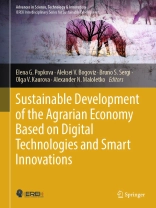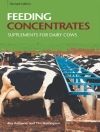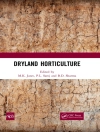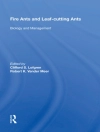This book elaborates on the modern experience and prospects and the development of recommendations for sustainable development of the agrarian economy based on digital technologies and smart innovations for the provision of food security. This book dwells on the global and regional challenges for food security and answers to them through the sustainable development of the agrarian economy. The book also studies the international experience of sustainable development of the agrarian economy on the basis of digital technologies and advantages for food security. Sustainable development of the agrarian economy with the use of digital technologies—as the foundation of food security of Central Asia—is considered. The prospects for provision of food security through the use of smart innovations for the sustainable development of the agrarian economy are outlined. A set of applied recommendations for raising the effectiveness of the use of smart innovations for the sustainable development of the agrarian economy is proposed.
Tabla de materias
Part 1. International experience, cooperation, and trade in global food markets in support of the sustainable development of the agrarian economy based on digital technologies and smart innovations .- 1.
Formation of New Mechanisms for Sustainable Development of the Rice Farming in Kyrgyzstan.- 2. Accumulation and Consumption in the Agricultural Sector of the Russian Economy.- 3. Rural Tourism as a Factor in Overcoming Poverty in the Kyrgyz Republic.- 4. Changing the Global Production and Trade of Citrus Fruits.- 5. International Banana Trade: Volumes, Countries, and Trends.- 6. Market Pattern Analysis of Russia-Vietnam Chocolate Confectionary Trade.- 7. Transformation of the Positioning of Countries as a Result of the Transition of the World Economy from Globalization to Regionalization.- 8. The Impact of Parallel Imports on the Activities of Russian Marketplaces.- 9. Ways to Improve the Innovative Development of Kyrgyz Agriculture.- 10. The Impact of Anti-Russian Sanctions on the EU.- 11. Prospects for Development Cooperation between China and the Republic of the Congo.- 12. Investment Сooperation in Agriculture between China and Russia: Current Status, Problems and Prospects.- 13. International Cooperation in the field of Food and Mineral Fertilizers.-
Part 2. Applied organizational and management solutions for the sustainable development of agrarian organizations based on digital technologies and smart innovations .- 14. Comparative Comprehensive Assessment of Agricultural Organizations Toolkit.- 15. The Concept of Re-equipment of Nevinnomysskiy Azot JSC Production in the Conditions of the Development of Agricultural Economy Based on Digital Technologies.- 16. SDG7. New Assessment Methods.- 17. Exit Interview as a Tool to Reduce Staff Turnover in an Organization.- 18. Prospects for the Development of Innovations in Digital Marketing.- 19. Parameters of the Development of Organizational-Economic Processes of Agriculture in the Conditions of Transformation.- 20. Financial Transparency of Economic Activity as a Principle of Corporate Management of Agricultural Enterprises.- 21. Potential Effect of Digitalization of Fixed Asset Management at the Enterprises of the Agro-Industrial Complex.- 22. Shaping Buying Behavior with Regard to Food Selection and Consumption.- 23. Assessment of Adaptation Activity of Agricultural Business Subjects in the Project-based Approach.- 24. Method for Assessing the Economic Efficiency of Digital Technologies in Dairy Farming Considering Changes in Process Parameters.- 25. Marketing of Contemporary Agricultural Businesses: Problems and Growth Prospects.- 26. Agile Project Management as a Factor of Competitiveness of Russian Companies in a Turbulent Economic Environment.-
Part 3. Social and legal aspects of the sustainable development of agrarian economy basedon digital technologies and smart innovations: staffing, human resources management, and ESG governance.- 27. Agricultural Policy in Russia: Prospects for Transformation in the Context of Deglobalization.- 28. Food Security of Russia in the Context of International Economic Sanctions.- 29. Agricultural Insurance as a Factor of Sustainable Agricultural Development.- 30. Preparing Future Teachers to Use Digital Learning Technologies.- 31. The Problem of Training Digital and Creative Personnel for the Production Sector of the Economy.- 32. Human Resource Management Tools for Companies Based on ESG Guidelines.- 33. Development of Vocational Education in the Context of Sustainable Development of Society.- 34. Theoretical Foundations for Creating a System of Independent Assessment of the Educational Results of Future Teachers.- 35. Regional Labor Market in the Period of Digital Transformation of a Traditionally Agricultural Region: Assessmentand Forecasting of the Conjuncture.- 36. ESG-Principles in the Practice of Sustainable Economic Development.- 37. Competition as a Form of Exercising the Right to Entrepreneurial Activity: A Civilistic Aspect.- 38. Legal Presumptions of Good Faith and Reasonableness of Entrepreneurial Activity.-
Part 4. Advanced digital technologies, smart innovations, and prospects
for their application in the agrarian economies of countries, regions, and organizations in support of food security. – 39.
Export Potential of the Region: Problems of Estimation, Modelling, and Forecasting.- 40. Water Resources as a Strategic Factor of the Region’s Sustainable Development.- 41. Analysis of the Dependence of Agricultural Production Efficiency in the Regions of Russia on the Availability of Resources Based on the Multidimensional Grouping Method.- 42. Assessment of Consumer Demand for Organic Products in the Moscow Region.- 43. Relationship of Vegetation Indices of Winter Wheat Determined by Digital Device on Different Agricultural Backgrounds in the Chernozem Zone of Stavropol.- 44. Physical Condition of Soil in Sorghum Seeds Depending on Forecrop and Yield in Arid Zone Conditions.- 45. Factors and Conditions for Ensuring the Sustainable Development of Viticulture and Winemaking in Russia.- 46. Using Visual-block Programming Environments to Create Robotic Systems.- 47. Methodological Basis for Assessing Negative Factors of Mineral Extraction on Beds of Rivers and Watercourses.- 48. Development of Land Surveying Science and Education as Factors of Reliable Provision of the Country’s Food Security.- 49. Structural Transformation of Accumulation and Consumption in Agricultural Production as the Basis of its New Industrialization.- 50. Directions for Increasing Rice Yield and its Predicting.
Sobre el autor
Olga V. Kaurova is Doctor of Economics, Professor, Russian University of Cooperation, Mytishchi, Russia. Educational Background: State Academy of Services, Economist, 1995. Academic Degrees: Doctor of Economic Sciences, specialty 08.00.05 Economics and Management of the National Economy: the theory of management of economic systems; macroeconomics; economics, organization, and management of enterprises, industries, complexes; innovation management; regional economy; logistics; labor economics, Russia, 2011. State Awards, Other Awards, and Distinctions: Honored Worker of Higher Education of the Russian Federation (2008), Excellence in consumer services for the population (2002). Research Interests: education, economic security, service sector, hospitality, modern technologies.
Aleksei V. Bogoviz received his Ph.D. in Economics in 2007, having defended his thesis on the Economics of Regional Agro-Industrial Complexes. This topic also prevailed in further research. His scientificactivity aimed at creating and developing viable solutions for a sustainable future and positive social transformations in the field of cooperation, based on integrated and innovative science-based approaches. His research interests are related to the mechanisms of cooperation in the context of the digitalization of the economy and the spread of artificial intelligence technologies, the study of which contributes to the understanding of measures and actions aimed at achieving the 17 Sustainable Development Goals set out in the UN for 2030. Aleksei V. Bogoviz does a lot of organizational work to form temporary research teams and collaborations between universities in Russia and foreign countries. He is Author of more than 200 contributions in international top-rated publishers in their field and is Member of the organizing committees of some international scientific conferences. He combines his research activity with many years of pedagogical work. Aleksei V. Bogoviz has been working as Professor at the National Research University “Higher School of Economics”, and for now, he is Visiting Professor at several Russian universities.
Alexandr N. Maloletko is Doctor of Economics, Professor, Russian University of Cooperation, Rector’s Office, the Department of Economics and Management, 12/30 Vera Voloshina Street, Mytishchi, Russia. Educational Background: Kharkov Higher Military School of Logistics, Engineer-Economist, 1989, Military Academy of Logistics and Transport, St. Petersburg, Organizer of Material and Technical Supply, 1997. Academic Degrees: Doctor of Economic Sciences, specialty 08.00.05 Economics and Management of National Economy (Economic Security), Russia, 2010. State Awards, Other Awards, and Distinctions: Certification of Commendation of the Federation Council (2016), medals ‘For Excellence Service’ I, II, III degree.Bruno S. Sergi is Instructor at Harvard University, where he is also Faculty Affiliate at the Center for International Development and Associate at the Harvard Davis Center for Russian and Eurasian Studies and the Harvard Ukrainian Research Institute. He is Full Professor at the University of Messina, Italy. His research and teaching interests tie to the broader topic of the economics of emerging markets. In addition, he is Co-director of the Lab for Entrepreneurship and Development (LEAD), a research laboratory based in Cambridge (USA) that aims to generate and share knowledge about entrepreneurship, development, and sustainability.
Prof. Dr. Elena G. Popkova is Doctor of Economics, Founder and President of the Institute of Scientific Communications (Volgograd, Russia), Professor of RUDN University, Moscow, Russia, Author of more than 150 publications in Scopus (h-index: 31), Editor of more than 50 books and a large number of special issues of international peer-reviewed scientific journals, Member of the editorial board of the International Journal of Economic Policy in Emerging Economies and the International Journal for Quality Research, Recipient of Highly Commended Paper Award for the journal On the Horizon for 2020 (Emerald), Honored Worker of science and high technologies of the Russian Federation, and Honored Professor of Osh State University (Osh, Kyrgyzstan). She is among Scopus top 2% of most-cited scholars of the world in 2019–2021.












